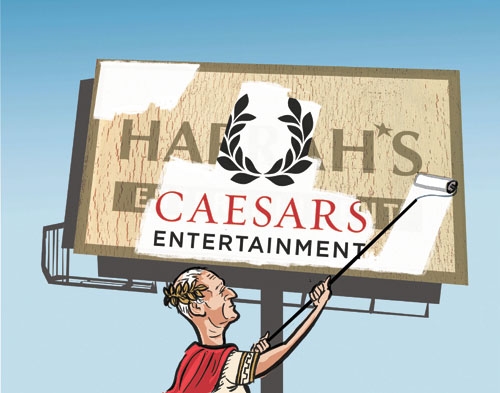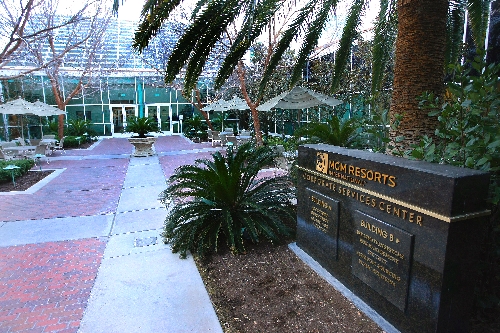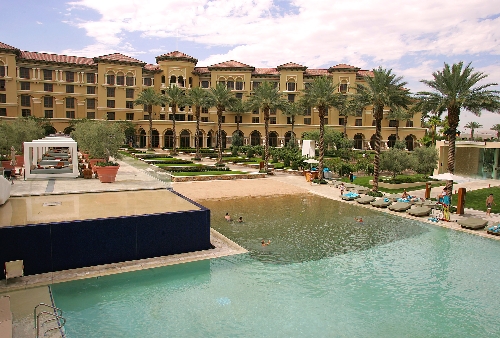Las Vegas casinos rename their corporations for many reasons




In the corporate world, companies that change their names are usually trying to fool consumers and investors into forgetting past misdeeds.
Tarnished accounting firm Arthur Andersen became Accenture.
Scandalized telephone carrier WorldCom is now MCI.
The public wasn’t duped.
"The most common reason for a brand identity change is to get over a bad chapter in their corporate history and erase the past," Los Angeles-based national branding expert Rob Frankel said. "Most of the time, it doesn’t work."
Two of the casino industry’s largest companies switched their corporate names last year for entirely different reasons.
Unlike damaged companies, Nevada’s biggest casino operators want longtime customers to remember the history. They also want their patrons to embrace the future.
MGM Mirage officially became MGM Resorts International in June, a corporate umbrella covering nearly two dozen hotel-casinos and nongaming hotels in three states and two countries the company acquired or built over the past decade.
In November, Harrah’s Entertainment switched to Caesars Entertainment Corp., a change that was originally announced three years after a corporate merger created the world’s largest gaming company that now operates 53 casinos across 12 states and six countries and owns the World Series of Poker.
Corporate rebranding in the gaming industry may continue this year.
Las Vegas Sands Corp. is contemplating dropping "Las Vegas" in favor of the word "international." The company earns more than 80 percent of its annual revenues from its casinos in Macau and Singapore. Chairman and Chief Executive Officer Sheldon Adelson has made no secret of his desire to look at casino possibilities in other foreign markets, including Spain, Japan and India.
However, the idea has gone nowhere since Adelson floated it in September.
Herbst Gaming, which exited Chapter 11 bankruptcy on Dec. 31 without any members of the founding Herbst family having a day-to-day role or ownership in the restructured company, will most likely be given a new corporate name by the end of 2011.
Company CEO David Ross said it makes sense to drop "Herbst" from the title. A process to do so, however, hasn’t been formalized. Ross expects the Herbst family to eventually return to the gaming industry, which would expedite development of a new corporate brand.
"We don’t want to confuse the customers or the market," Ross said.
Branding experts said a name change should not be taken lightly.
In the same vein, a name change doesn’t always impress investors.
"I don’t think a tiger really changes its stripes overnight," Credit Suisse Securities gaming analyst Joel Simkins said.
Frankel said the changes by MGM Resorts and Caesars may have been done for the right reasons. MGM Resorts focused on brand strategy while Caesars adopted the name of its blue-chip brand.
Both companies, Frankel said, apparently investigated the process before making the move.
"These changes seem to be pretty well understood," Frankel said.
Name changes can be costly and complicated. Not only do official documents, letterhead, business cards and other physical elements have to be changed, but building signs may have to be replaced, too.
Switching out corporate website addresses and company e-mails can also take time.
Officials from MGM Resorts and Caesars Entertainment said each company spent well over a million dollars to complete their name changes.
"You better like the name and have done your focus groups," Simkins said. "Investors are going to be watching those costs."
In the past, gaming industry corporate name changes reflected a newer and more dominant casino brand.
In 1990, Steve Wynn’s Golden Nugget Corp. became Mirage Resorts, recognizing the opening of The Mirage and a physical move by the corporation from downtown Las Vegas to the Strip.
Circus Circus Enterprises became the Mandalay Resort Group in 1999, a change that seemed to be a little more palatable to Wall Street investment bankers looking to back the company’s additional casino development plans.
David G. Schwartz, director of the Center for Gaming Research at the University of Nevada, Las Vegas, said name changes are often overlooked by customers, who identify more closely with an individual casino rather than the parent corporation.
MGM Resorts Chief Marketing Officer Bill Hornbuckle hopes the name change will mean customers of the Bellagio, Luxor, Mandalay Bay, Aria, Circus Circus and other company resorts will think beyond their individual resort.
MGM Grand grew from a single casino operation to eight properties when the company bought Mirage Resorts for $6.4 billion in 2000. The corporate name became MGM Mirage. The acquisition of the Mandalay Resort Group in 2005 for $7.9 billion expanded MGM Mirage to a corporation that encompassed 28 casinos in five states.
Experts argued that a name change should have been undertaken at that point. Some customers thought MGM Mirage was just a two-casino operation — MGM Grand and The Mirage.
The recent rollout of M Life, the company’s revamped customer loyalty program that covers MGM Resorts’ spectrum of properties, also factored in the switch.
"People were confused who the company was," Hornbuckle said. "The new name signifies our legacy brand, MGM, the resort business we’re in now and our international work."
The company has more than a dozen potential management contracts for luxury nongaming hotels around the world under its MGM Resorts Hospitality subsidiary, using the MGM, Bellagio and Skyloft brands.
"This brings the company together, for clarity if anything else," Hornbuckle said.
The move by Harrah’s to become Caesars gives the casino operator a name that is more recognized domestically and internationally, said David Norton, the company’s chief marketing officer.
There are 17 Harrah’s-branded casinos around the country, But the company also operates 10 Strip casinos, including Paris Las Vegas, Bally’s, Rio and Planet Hollywood Resort. Caesars also owns the Horseshoe-branded casinos in the Midwest.
Norton said there are positives associated with the Harrah’s name. Caesars, however, has a different connotation.
"Caesars is a timeless brand," he said.
Harrah’s acquired Caesars in 2005 for $9 billion, but waited until 2008 to announce a name change. Norton said changing the company’s name when the deal was finalized would have given the public the wrong impression about which company bought the other. The much smaller Harrah’s was the buyer.
The name change was delayed because the economy tanked. The switch was reinstated in November when the company started and stopped an initial public stock offering.
"It just made sense to follow through with the name change," Norton said. "It reinforces the Caesars brand from a corporate perspective. But we also understand there is loyalty among customers and employees to certain properties."
Norton said the name change didn’t affect focus on Caesars’ Total Rewards customer loyalty program.
"Total Rewards has always had a cross- property focus," he said.
Frankel thought the changes by both MGM Resorts and Caesars would be seamless to customers. He said Las Vegas acts much as his hometown of Los Angeles does when it comes brands. Once a brand or corporate name has outlived its usefulness, it’s discarded for something new.
As for Las Vegas Sands becoming Sands International, spokesman Ron Reese said a potential name change is still under consideration.
Frankel thought Las Vegas Sands "might be seen as turncoat" if it dropped "Las Vegas" from its name. But the real brand, he said, is Sands, which is well recognized in foreign markets.
"If you’re making gazillions of dollars in Asia, rebranding may be the right tool for the right job," he said.
UNLV’s Schwartz begged to differ.
Las Vegas, he said, is a brand in itself that signifies gaming and entertainment.
" ‘Sands’ sounds more like something that involves cement," Schwartz said.
Contact reporter Howard Stutz at hstutz@reviewjournal.com or 702-477-3871.
FAMOUS NAME CHANGES, ACQUISITIONS IN LAS VEGAS• 1985 MGM Grand Hotel becomes Bally’s Las Vegas.
• 1989 Golden Nugget Corp. becomes Mirage Resorts Inc.
• 1996 Bally Gaming becomes Alliance Gaming Corp.
• 1998 Hilton Hotels Corp. spins off its gaming division to Park Place Entertainment Corp., which includes the Las Vegas Hilton, Flamingo Hilton, Bally’s and Paris Las Vegas on the Strip.
• 1999 Circus Circus Enterprises becomes Mandalay Resort Group.
• 2000 Caesars World Inc., including Caesars Palace, sold to Park Place Entertainment.
• 2000 MGM Grand Inc. purchases Mirage Resorts Inc., creating MGM Mirage Inc.
• 2003 Boyd Gaming Corp. acquires Coast Casinos.
• 2004 Park Place Entertainment Corp. officially changes its name to Caesars Entertainment Inc.
• 2005 MGM Mirage acquires Mandalay Resort Group.
• 2005 Harrah’s Entertainment acquires Caesars Entertainment.
• 2006 Alliance Gaming becomes Bally Technologies.
• 2007 Aladdin becomes Planet Hollywood Resort.
• 2010 MGM Mirage becomes MGM Resorts International.
• 2010 Harrah’s Entertainment becomes Caesars Entertainment Corp.












